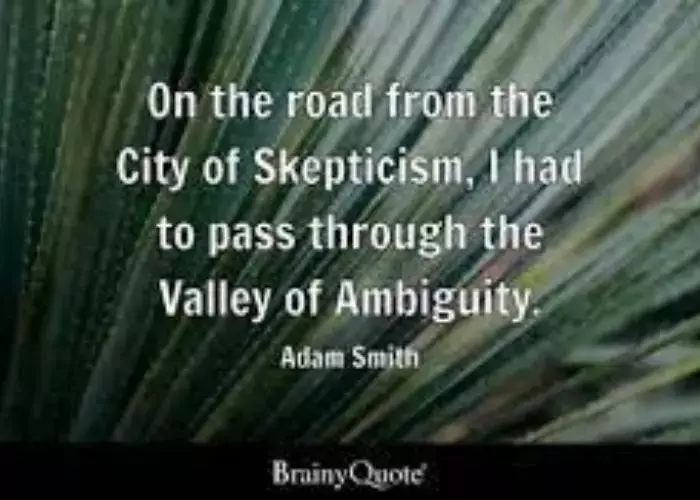Three Traits to Shun for Success, Achievement & Fulfilment

One more very interesting and insightful Bhagavad Gita sloka, this time negative mindset. Let us go to Chapter 4 sloka 40.
अज्ञश्चाश्रद्दधानश्च संशयात्मा विनश्यति । नायं लोकोऽस्ति न परो न सुखं संशयात्मनः - Bhagavad Gita 4.40.
Lord Krisna condemns three negative characteristics of people in this sloka. They are ajñaḥ, aśraddadhānaḥ and saṁśaya i.e., ignorant, lacking faith and doubters.
Persons who are ignorant as well as don’t repose faith, and who are of doubting nature, suffer sure downfall. There is no happiness either in this world or the next for sceptical souls.
All these three traits are very dangerous and are deadly when combined. Ignorance can be corrected if there is a faith in things including self-confidence. Lord Krishna used choicest and strong words against the doubters. That is why he declared “doubters can never enjoy happiness, not only in this birth even in the next birth”.
Have you ever met a successful leader who loves empty intellectual debates, guns down fresh ideas and initiatives and buries them with toxic scepticism? No, almost never!
Jump To Section

Earn As You Learn
Earn 25% commission when your network purchase Uplyrn courses or subscribe to our annual membership. It’s the best thing ever. Next to learning,
of course.
Optimism is One of the Prime Qualities of a Leader
How can a leader convince a team to take the leap, try new things, when he himself is a rank sceptic? How will the team blossom if they don’t try new ways, then fail and then with that lesson try over again?
Lord Krishna doesn’t mince words when he warns us against lack of faith in every support system – starting with Self, the team, the organization and may be faith in God, Not ordinary faith, unassailable faith.
The person who doubts everything, argues over everything and knows all the reasons why just about anything won't work may look smart but will end up being unhappy, unsuccessful and unfulfilled. Doubting everything and everyone and ascribing motives to every move would only add to the stress and the person can never be peaceful and happy.
You may ask if it is possible to bestow complete trust and faith on everyone. Some may not deserve trust. Better to trust if possible and avoid association if cannot be trusted.
Degrees of Perfection
The Bhakti Rasāmṛit Sindhu classifies sādhaks, acheivers, into three classes based on the degree of faith and knowledge:
śhāstre yuktau cha nipuṇaḥ sarvathā dṛiḍha-niśhchayaḥ
prauḍha-śhraddho ‘dhikārī yaḥ sa bhaktāvuttamo mataḥ
yaḥ śhāstrādiṣhvanipuṇaḥ śhraddhāvān sa tu madhyamaḥ
yo bhavet komala śhraddhaḥ sa kaniṣhṭho nigadyate (1.2.17-19).
“The highest sādhak is one who possesses knowledge of the scriptures and is also endowed with firm faith. The medium class sādhak is one who does not have knowledge of the scriptures, but is endowed with faith toward God and Guru. The lowest class sādhak is one, who neither has scriptural knowledge nor is endowed with faith.”
This applies to leadership as well. Good leader concentrates necessary knowledge and skills as well as faith – self, on the team as well as on the mission. Only then the leader can achieve success.
So, the Lord exhorts the seeker to work with faith, diligence, and determination. He should be filled with self-confidence and perfect faith wherever essential. Such a leader attains growth, realize their goal and live happy.
Knowledge
Kathopanishad extols the virtues of knowledge. This equates knowledge with good and ignorance with pleasant.
"दूरमेते विपरीते विषूची अविद्या या च विद्येति ज्ञाता । विद्याभीप्सिनं नचिकेतसं मन्ये न त्वा कामा बहवोऽलोलुपन्त - Kathopanishad" 1-2-4.
Shankara’s commentary for the above sloka - It has been stated that he who, of these pursues the good, attains the good and he who pursues the pleasant forfeits consummation; Because, these two travel at a great distance from each other, being mutually exclusive as they are of knowledge and ignorance, like light and darkness going different ways, i.e., leading to different results, being the cause of bondage and emancipation. Ignorance which, deals with ‘the pleasant’ and knowledge which deals with ‘the good,’ both well understood by the intelligent; here, I regard you Nachiketas, as longings after knowledge, because objects of desire the nymphs and the rest—which tempt the intellect of the ignorant, have not, though numerous, shaken thee, i.e., diverted thee from the path of ‘the good', by creating in you a desire for worldly enjoyment. Therefore, I regard you as longing after knowledge and worthy of attaining ‘the good.’
If you want to request for a Mentoring session, please click here.


Leave your thoughts here...
All Comments
Reply